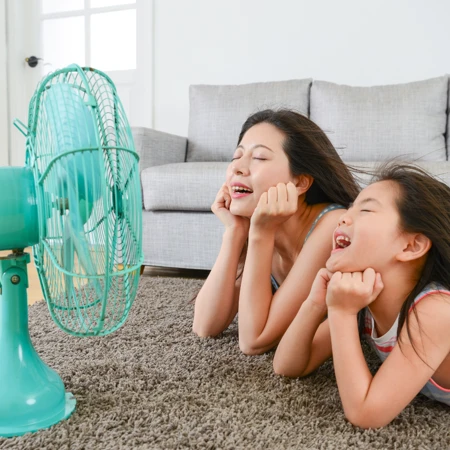With rising temperatures and heatwaves in the UK becoming more common, learning how to keep your home cool in the summer is becoming increasingly important. Not only does this help keep your energy bills down, it makes being in the house much more enjoyable.
Homes most prone to overheating
Some homes are more likely to overheat in extreme temperatures and while there isn’t much you can do to avoid that, it’s useful to know if you’re in a house which may need a bit of extra care to keep cool. Some of the top homes and buildings prone to overheating are:
- Top floor flats
- Flats with windows on a single side
- Homes with little to no external shading
- Homes in dense, urban areas
- Modern, airtight, and energy-efficient homes
- Homes with poorly insulated heating systems
While we will always advocate for energy-efficient homes, insulation that helps in the winter months becomes more of a problem in summer. While the UK relies more on keeping warmth in the home, and this is still the priority, you should take care to avoid overheating in the hot summer months and during heatwaves.
Easy ways to keep your home cool
Unfortunately, turning up the AC often means higher energy bills, and with the cost of energy at the moment, this simply isn’t an option for a lot of people. Let’s look at how we can avoid the high cost of air conditioning while still beating the heat and staying cool in a heatwave.
Keep your windows and blinds closed
As tempting as it may be to open your windows when it gets hot, this could compound the problem. While it may seem counterintuitive, keeping your windows closed during the day is one of the best ways to keep your home cool. This is especially true for south-facing windows.
To further trap the cool air, keep your blinds closed and your curtains drawn during the day. Once temperatures drop at night, you can open your windows and curtains back up to allow the cool night air to move through your house.
Create a cross breeze
When you can’t keep your windows closed, or it’s simply not working, aim to create a cross breeze in your home. Opening the right windows strategically is often more beneficial than opening them all at once.
Try opening windows on opposite sides of your house or room, and keep your doors open so air can circulate freely throughout. You want to create a channel for the hot air to move through while still getting the benefit of feeling a breeze.
Invest in houseplants
Indoor plants have recently become popular, but did you know there’s more to them than simple aesthetics? They certainly make spaces feel happier and brighter, but they can also help keep your home cool. Through a process called transpiration1, plants produce moisture into the atmosphere and serve as natural air conditioners.
Peace lilies and rubber plants are the most heat-efficient plants since they thrive in humid environments. Therefore, keeping a few indoor plants nearby should help keep your home cool in the heat. Just remember to water them occasionally, especially as temperatures rise.
Check your lightbulbs
Did you know that traditional incandescent light bulbs can give off about 90% of their total energy as heat2, which is why they get so hot. That heat contributes to a room’s overall temperature.
Why not change to more energy-efficient bulbs that don’t produce ambient heat? Not only will you save a bit of money, your home will be cooler in the heat.
Technological solutions
While not the most energy friendly, it may be necessary to invest in a good portable AC unit, or even a small electric fan. If you live with people who struggle with the heat or are particularly vulnerable, you may want to invest in something to keep a particular room or space in your home cool.
Remember that portable AC units need an external vent, so you’ll need to crack open a window and feed the tube through so all that hot air doesn’t come wafting back in.
Top tip: If are using a fan, place a bowl of ice water in front of it. This will help cool the air as it moves through the room, just remember to keep the bowl at a safe distance from the fan’s blades.
Beating the heat
You need to do what’s best for your home, finances, and health. Some homes will benefit more from these solutions than others, so trial a few different methods and see what works best for you.
Important information
Your home may be repossessed if you do not keep up repayments on your mortgage.
There may be a fee for mortgage advice. The actual amount you pay will depend on your circumstances. The fee is up to 1% but a typical fee is 0.3% of the amount borrowed.

